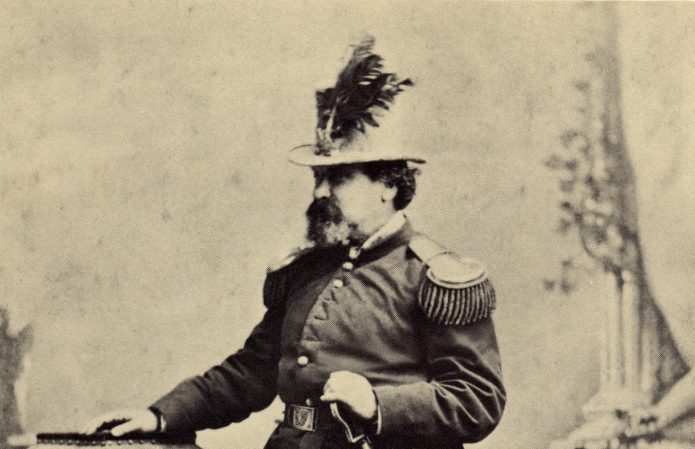
Biography: Emperor Norton I
This is one of my favorite stories. It’s a rags to riches to rags to insanity story. It’s what happens when the class clown is allowed to do whatever. Or it’s the story of how mental illness affects the homeless.
Joshua Norton was born in England in 1818, but grew up in South Africa. Around the time of the California Gold Rush, he traveled to California. There, his entrepreneurial spirit made him fairly successful.
In 1852, China banned the export of rice, causing a shortage. He decided to buy as much Peruvian rice as he could, thinking that it was the last load of rice that would arrive for a very long time. This would set him up for life. He bought it at 12 cents per pound, and would sell it for more than that, since it was the only rice available. Unfortunately, the Fates had other plans for him, and more ships carrying rice arrived. That caused the price of rice to plummet to 4 cents per pound. He was ruined. Even the court system ruled against him. He declared bankruptcy. People wouldn’t trust a business man who speculated so poorly. So he took some “me time”.
September 17th, 1859. A date that stunned the world. Or at least, San Francisco. Or at least, amused San Francisco. A message appeared in various newspapers.
“At the peremptory request and desire of a large majority of the citizens of these United States, I, Joshua Norton, … for the last 9 years and 10 months past of S. F., Cal., declare and proclaim myself Emperor of these U. S.; and in virtue of the authority thereby in me vested, do hereby order and direct the representatives of the different States of the Union to assemble in Musical Hall, of this city, on the 1st day of Feb. next, then and there to make such alterations in the existing laws of the Union as may ameliorate the evils under which the country is laboring, and thereby cause confidence to exist, both at home and abroad, in our stability and integrity.
Finally. We had a leader who would stand up for the little people. As Emperor, Norton I was a smart monarch. He tried to form a precursor to the United Nations, he wanted a bridge between San Francisco and Oakland, and he knew that Congress was bought and paid for by special interests. He even ordered the army to disband the Congress. Sadly, the army was derelict in their duties to Emperor Norton. Congress, acting in their own best interests, instead of ours, ignored our glorious leader.
In 1872, filled with pride in the City by the Bay, he issued a profound proclamation, declaring the use of the word “Frisco” to be a high misdemeanor, punishable by a $25 fine (roughly $475 in 2018 money).
The best part of Emperor Norton I, was that he didn’t live in an imperial palace. He lived amongst us. He routinely patrolled the city, inspecting it. The officers at the Presidio gave him a uniform, to which he added a hat with a regal peacock feather in it. He made note of damaged side walks, and monitored the cable cars. He wanted his capital to be in peak performance. He printed his own money that was accepted at some businesses, and when his uniform began to fray, the people worked together to buy him a new one.
Beloved by the people, he often ate for free. At one point, a riot broke out with protestors attacking Chinese immigrants. The fearless emperor positioned himself between the two groups and prayed. His god must have heard and supported his prayer, because the attackers dispersed.
In 1867, a foolish police officer, who was probably a spy for the evil Congress conspirators, arrested Emperor Norton. This angered the people so much, that they rose up to defend their leader. The police released the emperor and apologized, even admitting that other emperors were violent and corrupt, but not Norton. Norton, as benevolent as he always was, issued a pardon to the mistaken officer. From that point on, the police saluted the Emperor whenever they saw him.
On his way to the Academy of Sciences, on January 8th, 1880, at the age of 62, Norton I, Emperor of the United States and Protector of Mexico, died.
After his death, over 10,000 people from all walks of life took to the streets to mourn the loss. The procession was two miles long. The City of San Fransisco paid for the burial at the Masonic Cemetery, and the Pacific Club paid for a luxurious casket.
Norton I was a philosopher and ahead of his time in many ways. He would share his ideas and thoughts about everything from managing a vast empire to cuisine to anyone within the sound of his majestic voice. He inspired the likes of Mark Twain and Robert Lewis Stevenson. To this day, people make the pilgrimage to his grave. Since 1939, there have been, and still are, campaigns to rename the Bay Bridge to it’s proper name, the Emperor Norton bridge, after the man who first came up with the idea.
Emperor Norton is proof that in America, you can be anything. He’s an inspiration to me, and a beloved figure in California history.



One Comment
Pingback: